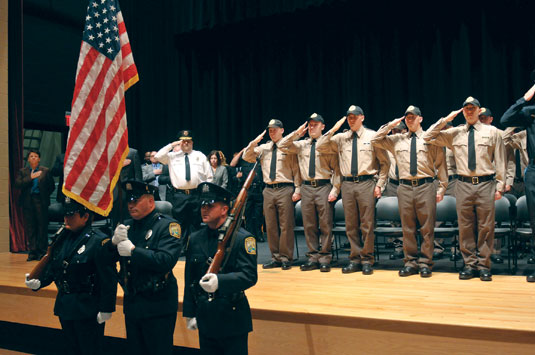Braver Than most: Temple University Police Academy trains those who answer the call to protect and serve

For newly minted Temple Municipal Police Academy graduate Jeff Stich, the decision to enter law enforcement wasn’t just a career move — it was a calling, an internal imperative to help others.
“This is something I’ve wanted to do my whole life,” said Stich, 24, a U.S. Air Force veteran who served in Iraq and Kuwait. “If you have the ability to do something to eliminate the negative in society, you have a responsibility to do it.”
Stich was one of 17 cadets who graduated from the Temple academy at a ceremony on Oct. 7 at the Ambler Learning Center. The following week, he was back at Ambler early on a Tuesday morning with four of his former classmates to help the newest academy class get acclimated to their new daily routine. The cadets approach one morning responsibility with particular reverence: the raising and lowering of the American flag at the center of campus.
“It’s about taking pride in your country while coming together as a class, going through the ceremony with the proper respect,” said Matt Reppert, 28, who served in Iraq and Afghanistan with the U.S. Army. “It’s important to know the basics, to have a set of skills to work from. While I was in the military, I found that I truly enjoyed working with people, and I wanted to do that while serving my community.”
Stich and Reppert are among the rare individuals who have chosen to place themselves in danger to ensure the safety of others. Police officers hold the protection of the community above all else, and for more than 40 years, the Temple University Municipal Police Academy has been training those who follow the calling to protect and serve.
Academy training is offered twice per year, typically starting in May and October; each session is 22 weeks long. The more than 760-hour curriculum provides a broad range of training that includes criminal law, defensive tactics, emergency vehicle driving, firearms instruction, ethics and integrity principles, said Anthony J. Luongo, director of Temple’s Criminal Justice Training Programs, the unit that administers the academy. Temple’s program supplies a steady stream of law enforcement officers to communities in Pennsylvania and beyond.
“Academy graduates are a combination of agency-sponsored and self-sponsored individuals who are undergoing basic recruit training,” said Luongo. “We are also seeing more veterans in the academy who have returned from serving in Iraq and Afghanistan.”
Temple began offering academy training in 1968. The academy is state certified by the Municipal Police Officers’ Education and Training Commission, and is taught wholly by active or retired full-time law enforcement practitioners. According to Police Academy graduate Stephen Colella, working with instructors who wear the uniform has multiple benefits.
“They’re sharing their professional experiences and what they’ve learned on the job,” said Colella, 24, who entered the academy with a degree in Criminal Justice from Lock Haven University. “The academy provides training in not just how to become a police officer, but how to get a job in law enforcement.”
According to Police Academy Director Robert Deegan, who himself began teaching in the program in 1977, Temple’s academy is widely recognized for its high academic standards.
“We have some of the best skills instructors in the state — some that are nationally recognized,” he said. “The skills training, the academy training, the life experiences that our cadets gain, are beneficial in any area. How you deal with people, how you diffuse difficult situations, these are skills essential to law enforcement that are applicable to any job.”
The academy strives to teach cadets not just how to do police work, but how to be a police officer with all the ideals and virtues that society demands, added Luongo.
“Policing is a tremendous opportunity to serve and to lead,” he said. “Literally, it is a job for those who stand up and say ‘I am willing to be braver than most. I will be fairer than others. I will be physically and emotionally stronger. I will be wiser.’”
The Criminal Justice Training Programs is a division of the Department of Criminal Justice, in the College of Liberal Arts. For more information, visit www.temple.edu/cjtp.